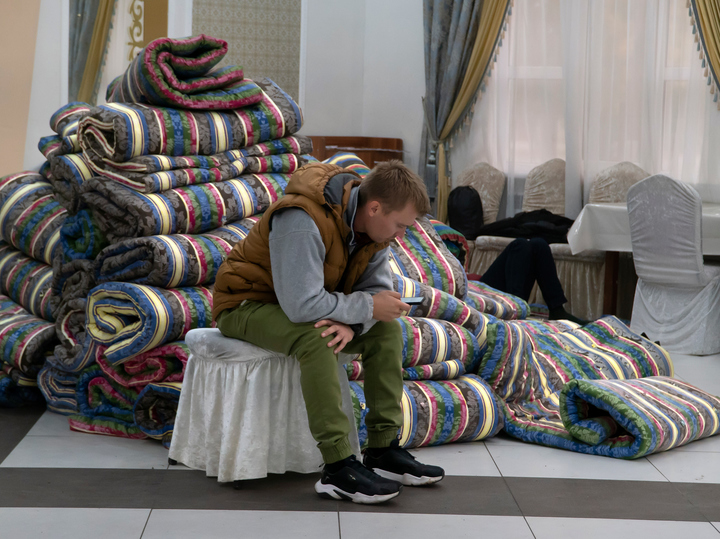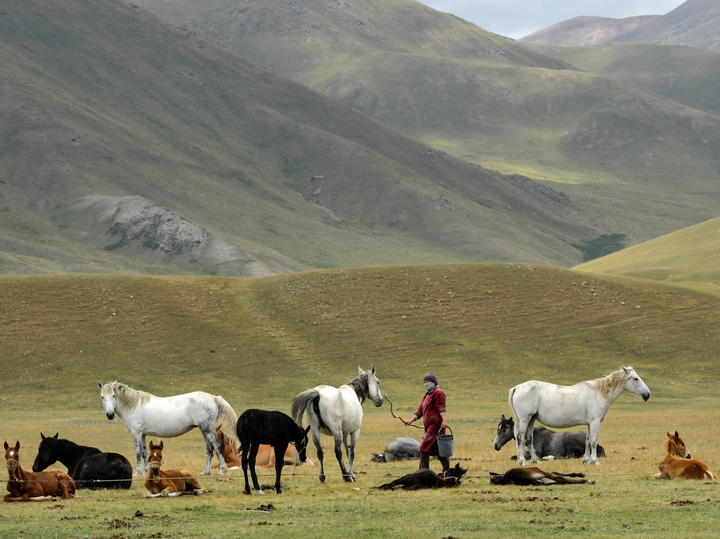How Russians are now treated in Kazakhstan and Kyrgyzstan
[ad_1]
Sergey, a resident of Alma-Ata, says that there are noticeably more Russian faces on the street. And mostly they are young males, but there are also families with children. Especially the influx of Russian citizens is noticeable in the cities of Northern Kazakhstan, in the same Uralsk for example.
Uralsk is located near the border itself, it is there that Russians cross it en masse. People come in cars, buses, some with small backpacks, and some with heavy trunks – the whole family, with children. On the border of Kazakhstan and Russia, even a tent camp has been formed, where people are settling with might and main in anticipation of the border crossing: they chop firewood, cook food in cauldrons.
In Alma-Ata and Astana, visitors are not so noticeable, they dissolve in the big city and arrive there mainly by planes with small suitcases.
For local residents, this “tourist hype” causes complex feelings. Many welcome visitors warmly, accommodate at their own expense. In Uralsk, for example, observing the flow of people crossing the border, they decided to leave the cinema open at night. Like, if people enter the city in the evening, it will be difficult for them to find housing right away, but here, after all, there is a roof over their heads and it is warm.
However, as experience has shown, few chose to spend the night in the cinema. No more than a dozen people spent the night in warm rooms on soft seats. Mostly young and accustomed to everything. But the inhabitants of Uralsk noticed sleeping people in their porches, but it is impossible to say with certainty that these are Russians. Perhaps these are locals without a fixed place of residence, whom visitors “forced out” from hostels.
Small Uralsk began to quickly adapt to the 40,000th “replenishment” of visitors. Groups of volunteers have been set up to meet and accommodate arrivals. Those crossing the border from the Kazakh side are met by several cars and minibuses, in which people are first fed and then taken to the city center free of charge. Because local taxi drivers fussed. Previously, they brought people from the checkpoint to the city for 300-500 tenge (35-60 rubles), but now – for 4,000 tenge (480 rubles). Which, however, confuses the Russians a little.
However, local residents decided that such a profit from visitors is offensive to Kazakhstan, and they themselves began to drive cars to the border in order to take people for free. They generally take patronage over the arrivals and help them find housing with the help of acquaintances and various services.
Prices skyrocketed
Local residents are, of course, a little worried that rental prices in the city have skyrocketed. However, for the residents of the Urals who rent apartments, this is only beneficial. Those who rented housing have problems, and now prices for it have risen. However, there are not many locals living in rented apartments in Uralsk. This problem is more relevant for Astana and Alma-Ata, where there are many students and workers from other cities. The prices have skyrocketed there. And some, without a twinge of conscience, began to evict people from rented apartments in the hope of earning more from the Russians.
For example, if earlier in Alma-Ata it was possible to rent an apartment for 250,000 tenge (30,500 rubles), today it is rented for half a million tenge (61,000 rubles). And this moment – the rise in rental prices – makes Kazakhstanis very angry.
In the same Alma-Ata, it is now very difficult to rent an apartment even for 2 days (by the day). It is impossible to raise prices for hostels and hotels especially – this is monitored by the Antimonopoly Committee. And if anything, they will accuse the owners of price fixing. This is an inconvenient and difficult case. With big fines.

Many of the Russians are considering going somewhere else later. This is especially noticeable in the correspondence of those who arrived in social networks. Now, for example, someone launched a chip – how wonderful it is to live in Mongolia. Often in the networks there are questions “How to come from Alma-Ata to Mongolia, to Ulaanbaatar?” Moreover, some do not even really know what kind of city in Mongolia they need. According to the latest data, out of 100,000 who have entered, 50,000 have already left Kazakhstan.
According to Sergey, those who have relatives and friends stay in Kazakhstan. The easiest way is for those who have already calculated everything and have a remote job.
By the way, there are no problems with getting a job in Kazakhstan. A work visa is issued, and you can go to work. The only question is the price. Finding a high paying job is really hard. But a lot is seasonal. However, salaries in Kazakhstan are lower than in Russia. But the level of costs is also lower, so getting enough for housing and food is not a big problem.
Kazakhstan attracts by the fact that the mentality is quite similar and there are no special nuances. Except some behavioral ones. Now volunteers or YouTube videos teach Russians how to behave in Kazakhstan. Help groups were launched on social networks: “Russians in Almaty”, “Russians in Astana”. They throw off information there, which applications are better to use in Kazakhstan, where to go, how to do this or that …
The fact that the Russians “eat all the food” or the prices will rise is not very much feared in Kazakhstan. On the contrary: it is believed that the more they buy, the more fresh they will bring. Prices are constantly rising, and this is not connected with the Russians, and the shortage that arises for certain products – the same sugar – is more likely to be associated with the jam season than with visitors.
However, there are queues in cities – for local SIM cards, in public service centers – public service centers. Some of the Centers that are in high demand have even switched to an enhanced mode of operation. In several of them, separate windows were allocated specifically for the Russians. To those public service centers that are overcrowded, akimats have made free routes, in addition, they have built logistics and are trying to take Russians to those centers where there are now fewer people in order to evenly distribute the load.
“Don’t say – Kyrgyzstan”
In Kyrgyzstan, the situation with migrants from Russia does not even remotely resemble what is happening in Kazakhstan. In Bishkek, there are no queues at shops, banks and registration centers. There are noticeably more people of European appearance on the streets, but this is a common occurrence for the end of the tourist season. But a lot of people in cinemas during working hours is an unusual phenomenon: Kyrgyzstanis and tourists go to the cinema a little on weekdays. There is no rush or increased demand for any product in stores or markets, except that there are no dollars in exchange offices, but a very large number of rubles are available.

Kyrgyzstan, like Kazakhstan, is considered by Russians as a “transshipment base” – to take a break, exchange dollars and euros at a more or less acceptable rate and decide how to live on.
But so far, house prices in Bishkek have skyrocketed by more than 30% in a week. Apartments and houses acquire tenants in just hours. In the southern residential districts, for a one-room apartment in a new “elite” building, they are now asking up to $600, more than 50,000 soms, with a deposit of half the amount and utility bills. Rent mostly only for a long time – for six months or more. One-room ordinary apartments have reached 30-40 thousand soms, that is, $350-400 plus utilities, and earlier they cost $250-300. Many hosts also ask for a deposit, up to 70% of the amount.
Some apartment owners even kicked residents out onto the street – several victims turned to human rights activists through social networks. Online, lawyers advise affected Kyrgyzstanis to set tax authorities on such homeowners. Why is only such retribution possible? Because often in Kyrgyzstan, landlords of apartments, houses and rooms conduct business outside the law and do not pay any deductions. And they do not conclude any contracts on paper – even without notarization.
In Kyrgyzstan, visitors, as in Kazakhstan, are generally treated calmly and kindly. There are groups to help Russians, which offer temporary housing and food for those in need, volunteers can show the city, help with registration and work. But, as in Georgia, Armenia, Kazakhstan, there are manual posts on the Web on how to behave when you arrive. One thing unites these tips and memos – the requirement “speak not Kyrgyzstan, but Kyrgyzstan”.
You can stay in Kyrgyzstan without registration for 30 days, then you need someone who will register on your territory, and after that you can live on a residence permit for another six months. But after six months, you must either leave or renew your registration. There were no simplifications for obtaining citizenship. But it will be easier to get it, if desired, for those who were once already a citizen of Kyrgyzstan. To apply for citizenship back under the simplified type, they only need to live in the country without leaving the country for a year.
[ad_2]
Source link








